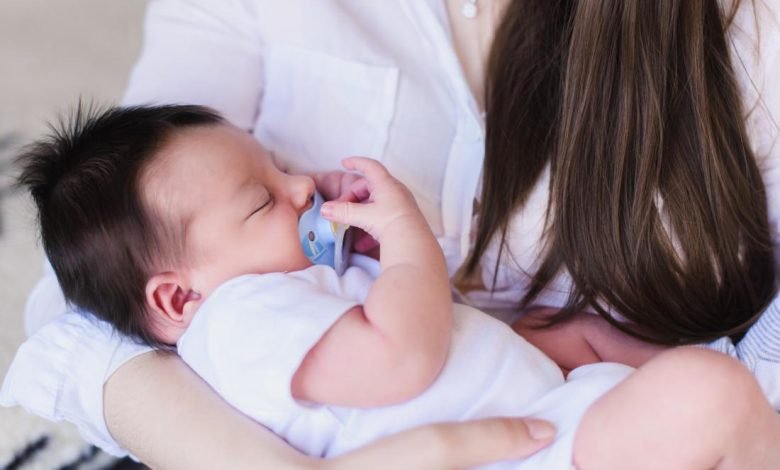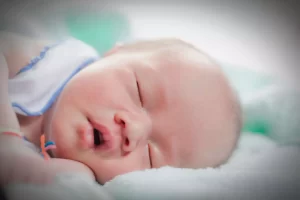Baby Snoring: Causes, Symptoms, and Treatment
Baby Snoring: Causes, Symptoms, and Treatment

New parents have a long list of concerns: diapers, sleepless nights, constant crying, milestone expectations, being the best parent while managing your own life, etc. Instead of worrying about things that may or may not be in your control, let’s focus on baby snoring. True. Infant snoring may seem surprising or even concerning, but it’s usually just a sign of early development. Do not be concerned; everything will be OK.
Newborns lack the cultural awareness or tact to know that snoring and snorting are not typical infant behaviours. Therefore, newborns snore. Babies breathe loudly, especially when sleeping. Even though a newborn’s breathing often sounds like snoring, this is a normal stage of development. Snoring is just the soft tissues of your baby’s airway vibrating.
Why Do Newborns Snore?
Because their nasal passageways are still developing, newborns snore. A baby’s nasal passageways are quite small, to begin with; even the slightest amount of dryness or additional mucus might cause them to snore while experiencing infant stuffy nose. Don’t worry, it’s simply how newborns sometimes sound. When their neck and throat muscles mature and nasal passageways enlarge, they’ll outgrow it. And when their neck muscles become stronger from doing tummy time, you’ll notice that newborn snoring decreases.
Why is my noisy newborn grunting, snoring and whistling in their sleep?
Babies breathe through their noses and have much more variable breathing rhythms than adults. While sleeping, a newborn can breathe up to 40 times per minute, compared to most adults who only breathe 12 to 20 times per minute. If you hear several rapid breaths followed by a brief period of rest before they begin to breathe again, don’t be alarmed; this is typically normal and most babies outgrow it by about six months.
While your baby is sleeping, you might also hear whistling or snoring. Occasionally whistling can be caused by a newborn’s constrictive nasal passage, but boogers are more likely to blame, according to Ouellette. Since most newborns are already congested due to spending nine months submerged in liquid, sneezing, coughing, and snorting may aid in clearing their mucus. Smaller nostrils can also be blamed for snoring; most babies will grow out of it.
Newborn Stuffy Nose — Welcome to Snot City, Population YOU
Baby snoring is frequently brought on by a simple conges nose. In this instance, nasal obstructions can be resolve and clean with straightforward remedies like saline drops. If your baby’s snoring doesn’t stop or worsens with saline drops, record it and play it for a doctor. This form of newborn snoring will grow out of them rather soon as their nasal passages expand. You may do this with a straightforward tape recorder or, in the twenty-first century, something you already own: a smartphone. There are numerous sleep applications that might be useful if you want to record your infant snoring.
Newborn Breathing Sounds Sure Are Strange
Baby snoring doesn’t always point to a major issue, but it does seem rather surprising to a new snorer’s parent. Babies snore softer than middle-aged people because they produce more mucous. Snoring from newborns is frequently describe as
– Whistling
– Snuffling
– Snorting
– Bubbling
– Musical
All of these terms describe the noise air makes when moving through, around, or over a liquid (mucus). Just as it does for you, snoring rises when your kid has a cold or allergies (or your partner). It’s true that a newborn’s breathing might sound peculiar.
4 Newborn Snoring Solutions
You can stop your infant’s snoring, which may bother them (or you). Try these, but be sure to consult your child’s physician first:
- Nasal Spray — Nasal sprays can help your infant breathe more easily and open up their nasal passages, and they have the pediatrician’s clearance. With just two to three drops of the saline solution into your baby’s nose once daily, you can get over-the-counter newborn nasal sprays in most pharmacies (rather than preparing your own owing to potential water contamination). Although kids might not first like it, they will eventually appreciate the improved sleep (by allowing you to get some much-needed sleep yourself!). The miracle of effortless infant breathing is yours!
- Nasal Aspirator — In many ways, a nasal aspirator is the reverse of a nasal spray. Instead of inserting anything to loosen mucus, you can use a nasal aspirator. These snot busters might initially look disgusting, but let’s face it—baby stuff in general is pretty unpleasant. You’ll be able to clean up that infant’s breathing at least using an aspirator. Let some fresh air in!
- Humidify Baby’s Room — Your home probably has dry air if you have central heating. A warm mist vaporizer or humidifier can assist humidify the air and reduce infant snoring when your baby’s nose is block. Similarly, a warm bath or shower will help relax nasal secretions, which may make it easier for your infant to fall asleep. Delete the newborn congested nose.
- Baby Sleeping Position — Infant snoring may be brought on by the sleeping position. Similar to adults, infants may snore due to their sleeping position. Compared to side sleeping, a baby is more likely to snore while they are sleeping on their stomach or back. Nevertheless, studies advise against letting your child sleep on their side since it may be harmful. A baby will snore less when they are old enough to sleep on their side naturally, but while they are very young, it is best to put them to sleep on their back, even if it makes them snore a little bit more. You may have to wait it out if your infant is snoring because they are on their back.
When Baby Snoring is More Serious
A more serious condition may be indicate by symptoms including abnormalities of the nose or airways, enlarge tonsils or adenoids, floppy upper airways, or undevelope cartilage. When this happens, a newborn’s breathing via the trachea and larynx might sound wheezy or make a sound known as “stridor,” which is a loud, high-pitched whistling or gasping. Excessive snoring may be a sign of sleep disruption in youngsters and might foretell future issues.

According to research by Karen Bonuck at the Albert Einstein College of Medicine, newborn and baby snorting may disturb prefrontal brain development, which can result in hyperactivity, emotional issues including anxiety and sadness, and behavioral difficulties. According to Elena, “sleep is a time to repair the brain’s cellular and chemical balance.” The brain gets less oxygen than it needs and maybe more carbon dioxide than it needs when sleep is disturbed.
If baby snoring persists, consult a doctor or sleep expert for advice.
Do Newborns Snore? Yes, and for the most part that is ok.
Be reassure that infant snorting is rather typical and to be expect if you’re worried about it. Your infant probably just has to grow out of it, given their small nasal passageways and any surplus mucus that may be coming out. Even while newborn snoring might increase dangers (especially when there are anomalies in the nasal passages), an expert pediatrician can detect this. Just let them know that you need comfort. A newborn baby snoring isn’t a terrible thing in the interim. Use a humidifier or a nasal aspirator to ease the pressure from accumulation… Or give it a few nights, and before you know it, your infant might quit snoring on their own!






